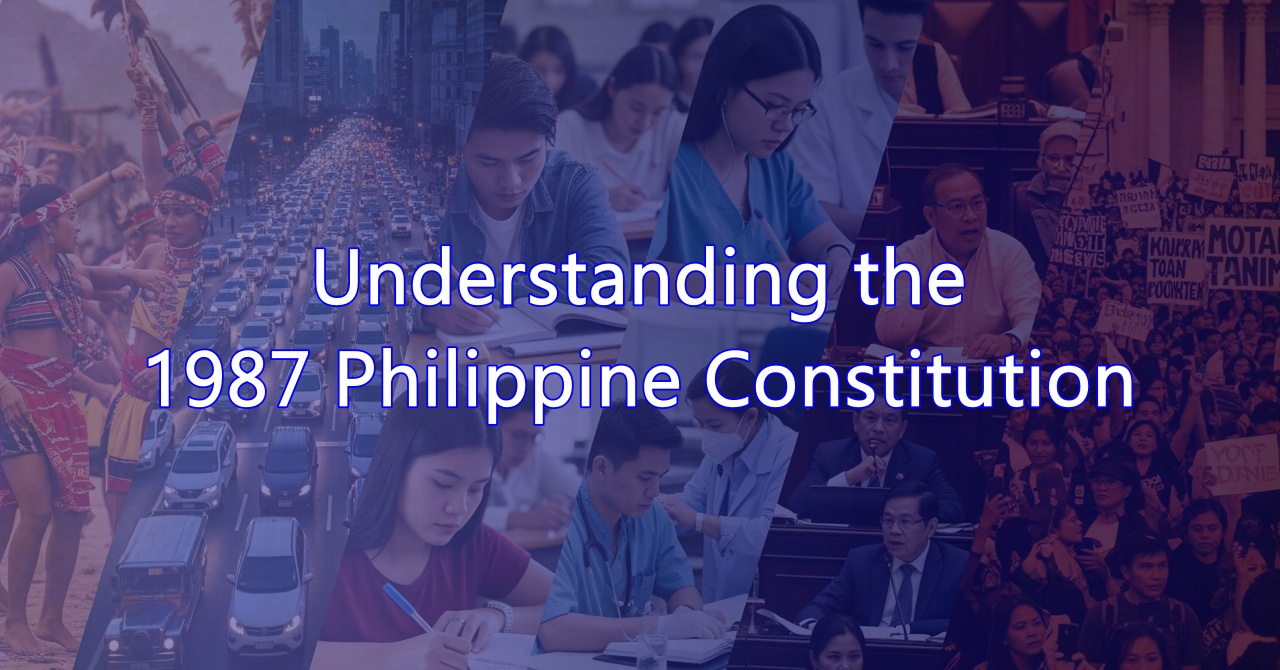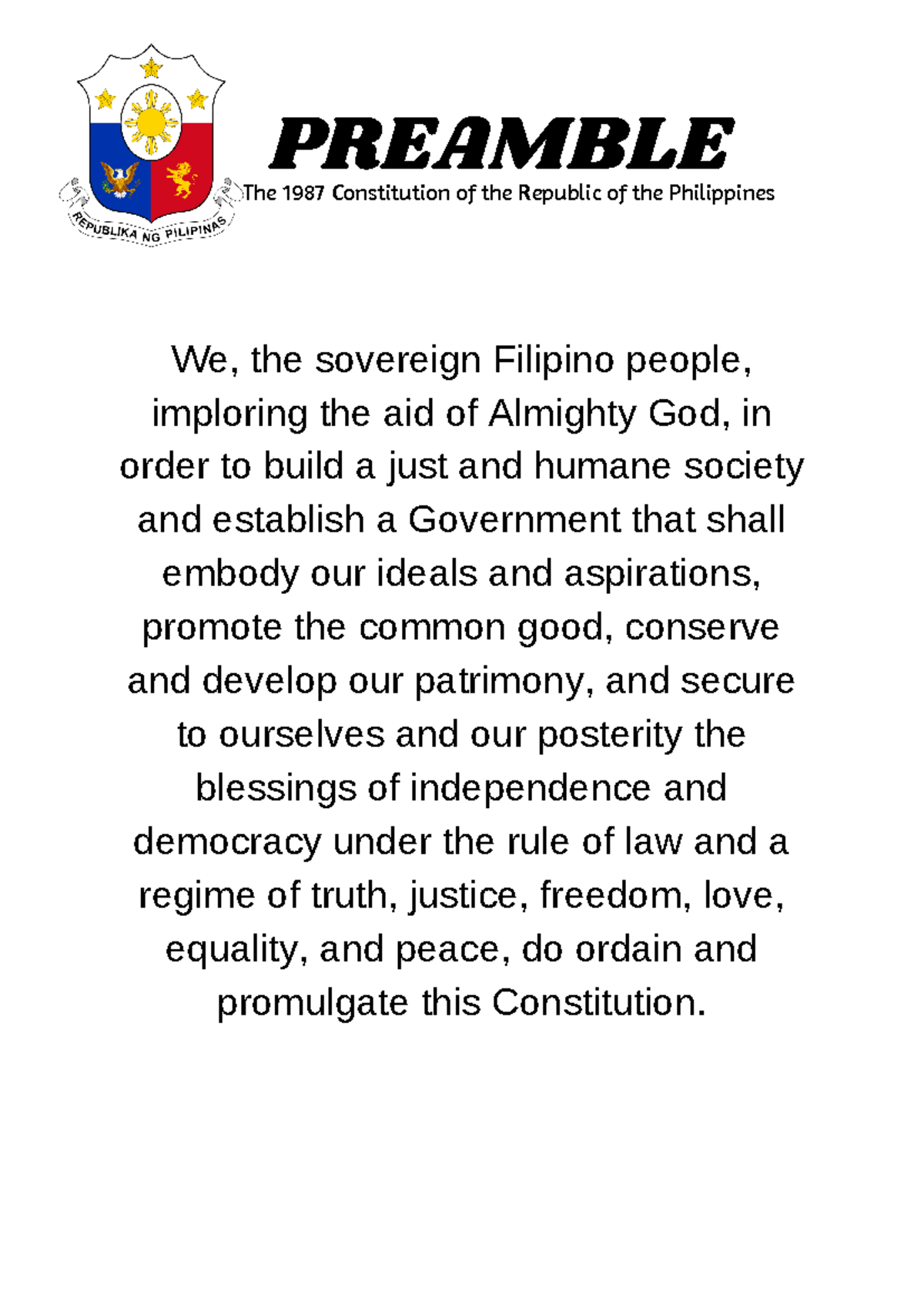Filipinos are paying attention to public life again. We talk about flood control, project delays, official accountability, and the everyday frustrations that come with poor services. None of these issues are new. We have seen versions of them for decades. If we want lasting change, there is a firm place to start: The Philippine Constitution. It is the highest law of the land, and it sets the ground rules for power, for public money, and for our rights as citizens.
Join us as we go through the heart of the 1987 Constitution, why it exists, how it is organized, which rights it guarantees, and how you can use it in daily life. You will also find short answers to common questions at the end.

What the Constitution Is, and Where It Gets Its Power
The Constitution is the country’s supreme law. Every statute, regulation, or executive action must follow it. It draws its authority from the Filipino people, a principle written at the start of the document in the Preamble. In simple terms, the people gave life to the Constitution, and the Constitution limits and guides government power on their behalf.
The text is organized into Articles. These cover big areas like the national territory, state policies, the Bill of Rights, citizenship, and the structure and powers of the legislative, executive, and judicial branches. Reading the table of contents alone is helpful if you want a map of public authority in one glance.
What the Preamble Promises
The Preamble states the values the Constitution aims to uphold, such as justice, freedom, truth, equality, peace, and the common good. It affirms that the people, assisted by God, created a government to serve those ends. Although the Preamble does not create enforceable rights by itself, courts use it to interpret the rest of the document, especially when values like human dignity and the rule of law are at stake.

National Territory, in Plain Language
Article I describes the national territory. It includes the Philippine archipelago and waters, as well as other areas where the Philippines has sovereignty or jurisdiction. It also mentions terrestrial, fluvial, and aerial domains, the territorial sea, and submarine areas like the seabed and subsoil. This article is key to maritime, resource, and boundary questions.
The Bill of Rights: Your Everyday Shield
Article III is the Bill of Rights. It protects people from government abuse and sets minimum standards for fair treatment. Several guarantees matter in daily life.
Due Process and Equal Protection
No one can be deprived of life, liberty, or property without due process of law, and everyone is entitled to equal protection. Due process has two parts. Substantive due process asks if the law itself is fair and reasonable. Procedural due process asks if the government followed fair steps, such as notice and a chance to be heard. Both parts keep power in check.
Searches, Seizures, and Warrants
The Constitution protects people from unreasonable searches and seizures. Judges must personally determine probable cause before issuing a warrant, after examining the applicant under oath, and the warrant must describe with particularity the place to be searched and the things to be seized. Evidence obtained in violation of these rules can be excluded in court. These protections are central in criminal cases and in everyday police encounters.
Privacy of Communication and Correspondence
Privacy of communication is inviolable, except when a court lawfully orders otherwise, or when public safety or order requires a limit that is set by law. This principle supports rules against unlawful surveillance and protects private messages, subject to narrow exceptions.
Freedom of Speech, Expression, Press, Assembly, and Petition
The Constitution protects open debate, peaceful protest, and independent media. Government may regulate time, place, and manner for safety and order, but it cannot silence ideas simply because they are unpopular or critical. These protections allow citizens to call out wrongdoing, demand services, and discuss public policy without fear.
Freedom of Religion
No official religion is allowed, and people may freely practice their faith. The state cannot impose religious tests for civil or political rights. The aim is to keep government neutral and to protect the inner freedom of belief and conscience.
Right to Travel and Liberty of Abode
You may move and travel within the country. Government may impair travel only in the interest of national security, public safety, or public health, and only as provided by law. This balance respects liberty while allowing targeted limits in times of danger, disaster, or disease.
Right to Information on Matters of Public Concern
Citizens have a right to information on matters of public concern. This covers access to official records and documents related to public acts and transactions, subject to limits set by law such as national security or privacy. The right helps people audit spending, check contracts, and hold officials accountable.
Right to Association and Protection of Property
People may form associations and unions for lawful purposes. Private property may not be taken for public use without just compensation, and laws cannot impair contractual obligations. These rules create stability for work, enterprise, and civil society.
Separation of Powers and Checks and Balances
The Constitution splits power among three branches to prevent concentration.
- Congress writes laws, approves the budget, and uses oversight.
- The President enforces laws, manages the executive departments, and can veto bills.
- The Judiciary interprets laws, settles disputes, and can strike down actions that violate the Constitution.
This design forces cooperation and creates checks. Each branch has tools to limit the others, which is vital when the topic is money, contracts, or investigations that could touch politically powerful actors.
There is also a policy statement outside the Bill of Rights that matters here. The Constitution directs the state to maintain honesty in public service and to take effective measures against graft and corruption. Agencies and courts often cite this as support for transparency, open government, and anti corruption reforms.
Evidence Collection Rules That Protect Everyone
Searches and arrests must be based on probable cause, determined personally by a judge. Warrants must be specific, and illegally obtained evidence may be excluded. These standards do more than protect the accused. They discipline law enforcement work, improve the quality of investigations, and help courts reach truthful outcomes.
Why the Constitution Still Matters for Daily Life
The Constitution appears abstract until you see how it works in routine situations.
- Barangay matters and local permits. Due process means you should get notice and a fair chance to be heard before penalties or closures happen.
- Police encounters. Officers need proper grounds for a search. You can assert your rights calmly and ask if there is a warrant and what it covers.
- Public spending. If you want to review a project, you can file a clear, polite request for records, citing the right to information on matters of public concern, and expect a lawful reply.
- Peaceful assemblies. Organizers should coordinate routes and safety, but the right to assemble and speak remains protected.
- Travel or health restrictions. Any limit must meet standards set by law and pursue a valid public interest, like safety or health.
These examples show the Constitution’s daily reach. It is not only for lawyers. It is a working tool for citizens who want honest services and fair treatment.
1987-Philippine-ConstitutionHow to Read the Constitution Without Getting Lost
You can navigate the document in a few passes.
- Start with the Preamble and Articles I to III. You will capture the values, the territory, and the Bill of Rights in one sitting.
- Skim the Articles on the branches. Look at powers and limits for Congress, the President, and the Judiciary to see how checks and balances work.
- Flag the anti corruption policies. Note the commitment to honesty, integrity, and public disclosure, because these support open records and clean contracting.
- Keep reliable copies. Use official and reputable sources when you quote or study provisions. The Lawphil Project hosts the full text and is a common reference in schools and courts.
Using Your Rights Responsibly
Rights come with duties. Here are practical habits that help turn constitutional promises into real change.
- Document issues. If you see a problem in a public project, record dates, locations, and photos, then ask for records using the right to information, within legal limits.
- Engage peacefully and persistently. Exercise speech and assembly rights with care for safety and property. Clear messages and lawful permits increase credibility.
- Respect process. File complaints through proper channels and observe timelines. Due process is a shield for you, and also a standard for how you raise concerns.
- Learn your local context. National rules interact with ordinances. Read both levels so you know when to cite the Constitution and when to cite local procedures.
A Note on Limits and Exceptions
Rights are strong, but they are not absolute. Courts have long recognized narrow exceptions, such as urgent searches in specific situations, or temporary travel limits during emergencies. The key test is reasonableness, legality, and necessity, supported by evidence and due process. These limits should be clearly stated in law, closely tailored to a real need, and applied evenhandedly.
Bringing It Back to Today
When people ask why some projects fail or why corruption persists, the Constitution offers two answers. First, it creates tools that citizens and institutions can use, such as the right to information, due process, and the courts’ power of review. Second, it sets values for honest service and full disclosure in government transactions. If we want change, we can start by knowing and using these tools, then asking institutions to meet the standards that the Constitution already sets.
Frequently Asked Questions
What is the Constitution, in one sentence?
It is the highest law that structures government power, limits officials, and protects citizen rights, and every other law must follow it.
Where does it get its authority?
From the sovereign Filipino people, as declared in the Preamble.
Which article protects my basic rights?
Article III, the Bill of Rights, covers due process, equal protection, privacy of communications, searches and seizures, free speech and assembly, religion, travel, and information.
How do I request public records?
Cite the constitutional right to information on matters of public concern, and follow agency rules that implement access while protecting narrow exceptions like national security and privacy.
Can the government restrict travel?
Yes, but only as provided by law, and only for reasons like national security, public safety, or public health.
What counts as unreasonable search or seizure?
As a rule, searches need a warrant issued by a judge after finding probable cause, and the warrant must be specific. Evidence gathered in violation of these rules may be excluded.
Final Thoughts
The Constitution is not a relic. It is a living framework that still speaks to the issues we face. It tells the government how to act, it tells citizens how to demand better, and it gives all of us a shared language for fairness, dignity, and accountability. The problems we see are not new, but the tools to fix them have been here all along. Start with the Constitution, learn it, use it, and insist that public power remain within its bounds.
